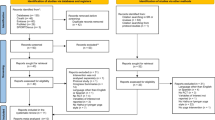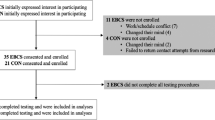Abstract
Purpose
Fatigue is one of the most common and bothersome refractory symptoms experienced by cancer survivors. Mindful exercise interventions such as yoga improve cancer-related fatigue; however, studies of yoga have included heterogeneous survivorship populations, and the effect of yoga on fatigued survivors remains unclear.
Methods
We randomly assigned 34 early-stage breast cancer survivors with cancer-related fatigue (≥4 on a Likert scale from 1–10) within 1 year from diagnosis to a 12-week intervention of home-based yoga versus strengthening exercises, both presented on a DVD. The primary endpoints were feasibility and changes in fatigue, as measured by the Multidimensional Fatigue Symptom Inventory-Short Form (MFSI-SF). Secondary endpoint was quality of life, assessed by the Functional Assessment of Cancer Therapies-Breast (FACT-B).
Results
We invited 401 women to participate in the study; 78 responded, and we enrolled 34. Both groups had significant within-group improvement in multiple domains of the fatigue and quality of life scores from baseline to post-intervention, and these benefits were maintained at 3 months post-intervention. However, there was no significant difference between groups in fatigue or quality of life at any assessment time. Similarly, there was no difference between groups in adherence to the exercise intervention.
Conclusions
Both DVD-based yoga and strengthening exercises designed for cancer survivors may be good options to address fatigue in breast cancer survivors. Both have reasonable uptake, are convenient and reproducible, and may be helpful in decreasing fatigue and improving quality of life in the first year post-diagnosis in breast cancer patients with cancer-related fatigue.


Similar content being viewed by others
References
American Cancer Society. Cancer treatment & survivorship facts & figures 2014–2015. 2014 [cited 2015 October 28]; Available from: http://www.cancer.org/research/cancerfactsstatistics/survivor-facts-figures.
Potash J, Anderson KC (2014) AACR cancer progress report 2014: transforming lives through research. Clin Cancer Res 20(19):4977
Hofman M et al (2007) Cancer-related fatigue: the scale of the problem. Oncologist 12(Suppl 1):4–10
Bower JE, Garet D, Sternlieb B, Ganz PA, Irwin MR, Olmstead R, Greendale G (2012) Yoga for persistent fatigue in breast cancer survivors: a randomized controlled trial. Cancer 118(15):3766–3775. doi:10.1002/cncr.26702
Bower JE et al (2006) Fatigue in long-term breast carcinoma survivors: a longitudinal investigation. Cancer 106(4):751–8
NCCN Clinical Practice Guidelines in Oncology. NCCN Guidelines for Supportive Care: Cancer-related Fatigue. [Guidelines] 2014 11/21/2012 [cited 2015 October 28]; Available from: http://www.nccn.org/professionals/physician_gls/f_guidelines.asp.
Schmidt, M.E. et al., Effects of resistance exercise on fatigue and quality of life in breast cancer patients undergoing adjuvant chemotherapy: a randomized controlled trial. International Journal of Cancer. Journal international du cancer, 2014
Steindorf K et al (2014) Randomized, controlled trial of resistance training in breast cancer patients receiving adjuvant radiotherapy: results on cancer-related fatigue and quality of life. Ann Oncol 25(11):2237–43
Rogers LQ et al (2015) Effects of the BEAT Cancer physical activity behavior change intervention on physical activity, aerobic fitness, and quality of life in breast cancer survivors: a multicenter randomized controlled trial. Breast Cancer Res Treat 149(1):109–19
Murtezani A et al (2014) The effect of aerobic exercise on quality of life among breast cancer survivors: a randomized controlled trial. J Cancer Res Ther 10(3):658–664
Milne HM et al (2008) Effects of a combined aerobic and resistance exercise program in breast cancer survivors: a randomized controlled trial. Breast Cancer Res Treat 108(2):279–288
Schmitz KH et al (2009) Weight lifting in women with breast-cancer-related lymphedema. N Engl J Med 361(7):664–73
Sagen A, Karesen R, Risberg MA (2009) Physical activity for the affected limb and arm lymphedema after breast cancer surgery. A prospective, randomized controlled trial with two years follow-up. Acta Oncol 48(8):1102–10
Holmes MD et al (2005) Physical activity and survival after breast cancer diagnosis. JAMA 293(20):2479–86
de Glas NA et al (2014) Physical activity and survival of postmenopausal, hormone receptor-positive breast cancer patients results of the Tamoxifen Exemestane Adjuvant Multicenter Lifestyle study. Cancer 120(18):2847–2854
Wanchai A, Armer JM, Stewart BR (2010) Complementary and alternative medicine use among women with breast cancer: a systematic review. Clin J Oncol Nurs 14(4):E45–55
Stan DL et al (2012) The evolution of mindfulness-based physical interventions in breast cancer survivors. Evid Based Complement Alternat Med 2012:758641
Greenlee H et al (2014) Clinical practice guidelines on the use of integrative therapies as supportive care in patients treated for breast cancer. J Natl Cancer Inst Monogr 2014(50):346–58
Bower JE et al (2005) Yoga for cancer patients and survivors. Cancer Control 12(3):165–71
Vadiraja HS et al (2009) Effects of yoga program on quality of life and affect in early breast cancer patients undergoing adjuvant radiotherapy: a randomized controlled trial. Complement Ther Med 17(5-6):274–80
Chandwani KD et al (2010) Yoga improves quality of life and benefit finding in women undergoing radiotherapy for breast cancer. J Soc Integr Oncol 8(2):43–55
Banasik J et al (2011) Effect of Iyengar yoga practice on fatigue and diurnal salivary cortisol concentration in breast cancer survivors. J Am Acad Nurse Pract 23(3):135–42
Moadel AB et al (2007) Randomized controlled trial of yoga among a multiethnic sample of breast cancer patients: effects on quality of life. J Clin Oncol 25(28):4387–95
Littman AJ et al (2012) Randomized controlled pilot trial of yoga in overweight and obese breast cancer survivors: effects on quality of life and anthropometric measures. Support Care Cancer 20(2):267–77
Kiecolt-Glaser JK et al (2014) Yoga’s impact on inflammation, mood, and fatigue in breast cancer survivors: a randomized controlled trial. J Clin Oncol 32(10):1040–9
Chandwani KD et al (2014) Randomized, controlled trial of yoga in women with breast cancer undergoing radiotherapy. J Clin Oncol 32(10):1058–65
Cheville AL et al (2013) A home-based exercise program to improve function, fatigue, and sleep quality in patients with stage IV lung and colorectal cancer: a randomized controlled trial. J Pain Symptom Manag 45(5):811–21
Berger AM et al (2010) Cancer-related fatigue. JNCCN 8(8):904–31
Donovan KA, Jacobsen PB (2010) The Fatigue Symptom Inventory: a systematic review of its psychometric properties. Support Care Cancer 19(2):169–85
Hann DM et al (1998) Measurement of fatigue in cancer patients: development and validation of the Fatigue Symptom Inventory. Qual Life Res 7(4):301–10
Stein KD et al (2004) Further validation of the multidimensional fatigue symptom inventory-short form. J Pain Symptom Manag 27(1):14–23
Stein KD et al (1998) A multidimensional measure of fatigue for use with cancer patients. Cancer Pract 6(3):143–52
Cella DF et al (1993) The Functional Assessment of Cancer Therapy scale: development and validation of the general measure. J Clin Oncol 11(3):570–9
Coster S, Poole K, Fallowfield LJ (2001) The validation of a quality of life scale to assess the impact of arm morbidity in breast cancer patients post-operatively. Breast Cancer Res Treat 68(3):273–82
Beaulac SM et al (2002) Lymphedema and quality of life in survivors of early-stage breast cancer. Arch Surg 137(11):1253–7
Eton DT et al (2004) A combination of distribution- and anchor-based approaches determined minimally important differences (MIDs) for four endpoints in a breast cancer scale. J Clin Epidemiol 57(9):898–910
Clark MM et al (2013) Randomized controlled trial of maintaining quality of life during radiotherapy for advanced cancer. Cancer 119(4):880–7
Adams R et al (2015) Cancer survivors’ uptake and adherence in diet and exercise intervention trials: an integrative data analysis. Cancer 121(1):77–83
Bluethmann SM et al (2015) Taking the next step: a systematic review and meta-analysis of physical activity and behavior change interventions in recent post-treatment breast cancer survivors. Breast Cancer Res Treat 149(2):331–42
Acknowledgments
We wish to acknowledge our valuable participants, and we thank Lace Up Against Breast Cancer (LAUBC) for funding this study. Special thanks go to Mrs. Kristi Simmons and Mrs. Linda C. Allen for help with editing the manuscript. We are indebted to Camille Kittrell, M.S., producer of the Exclusive Yoga DVD, for allowing us to use this program in our study. This paper was presented as an oral presentation at the Supportive Care in Cancer MASCC/ISOO 2015 International Symposium in Copenhagen on June 25–27, 2015.
Authors’ contributions
All the authors were involved with development of the study concept, design, data analysis, and manuscript writing and editing. Dr. Stan, Dr. Ivana Croghan, and Dr. Pruthi were involved with study oversight. Katrina Croghan participated in patient recruitment, data collection, and development of study materials. Sarah Jenkins provided statistical support. Dr. Cheville was part of the team that developed the REST strengthening exercise DVD used in this study.
Author information
Authors and Affiliations
Corresponding author
Rights and permissions
About this article
Cite this article
Stan, D.L., Croghan, K.A., Croghan, I.T. et al. Randomized pilot trial of yoga versus strengthening exercises in breast cancer survivors with cancer-related fatigue. Support Care Cancer 24, 4005–4015 (2016). https://doi.org/10.1007/s00520-016-3233-z
Received:
Accepted:
Published:
Issue Date:
DOI: https://doi.org/10.1007/s00520-016-3233-z




